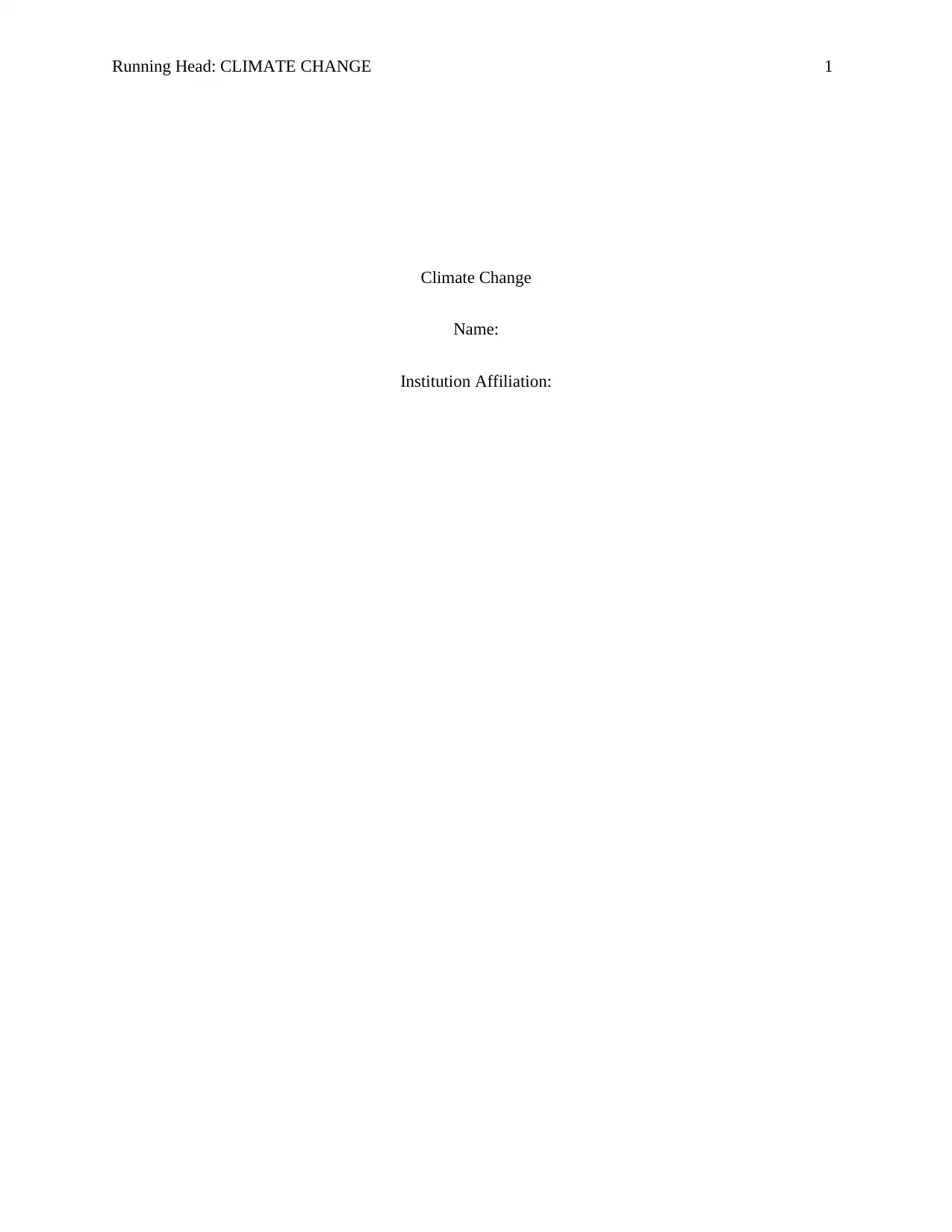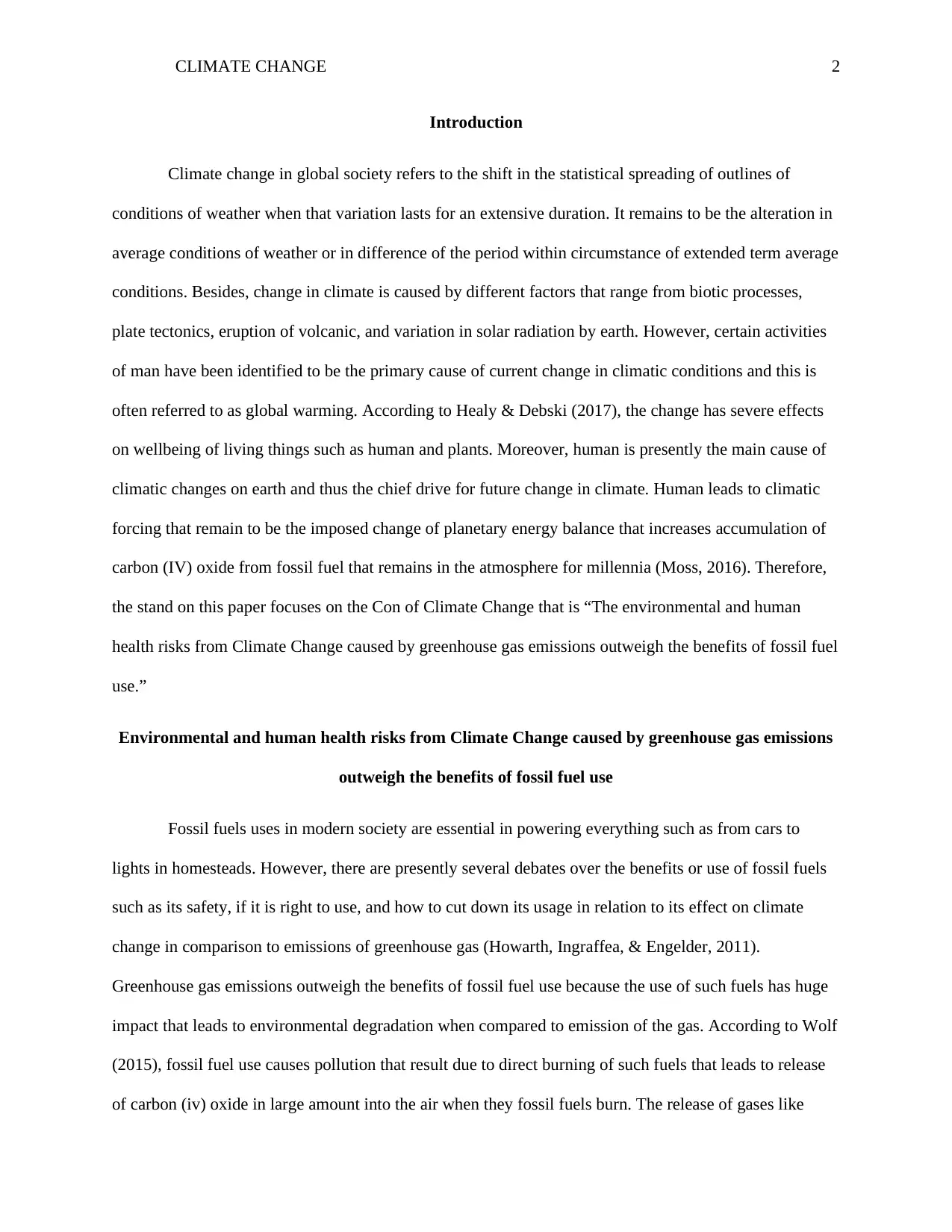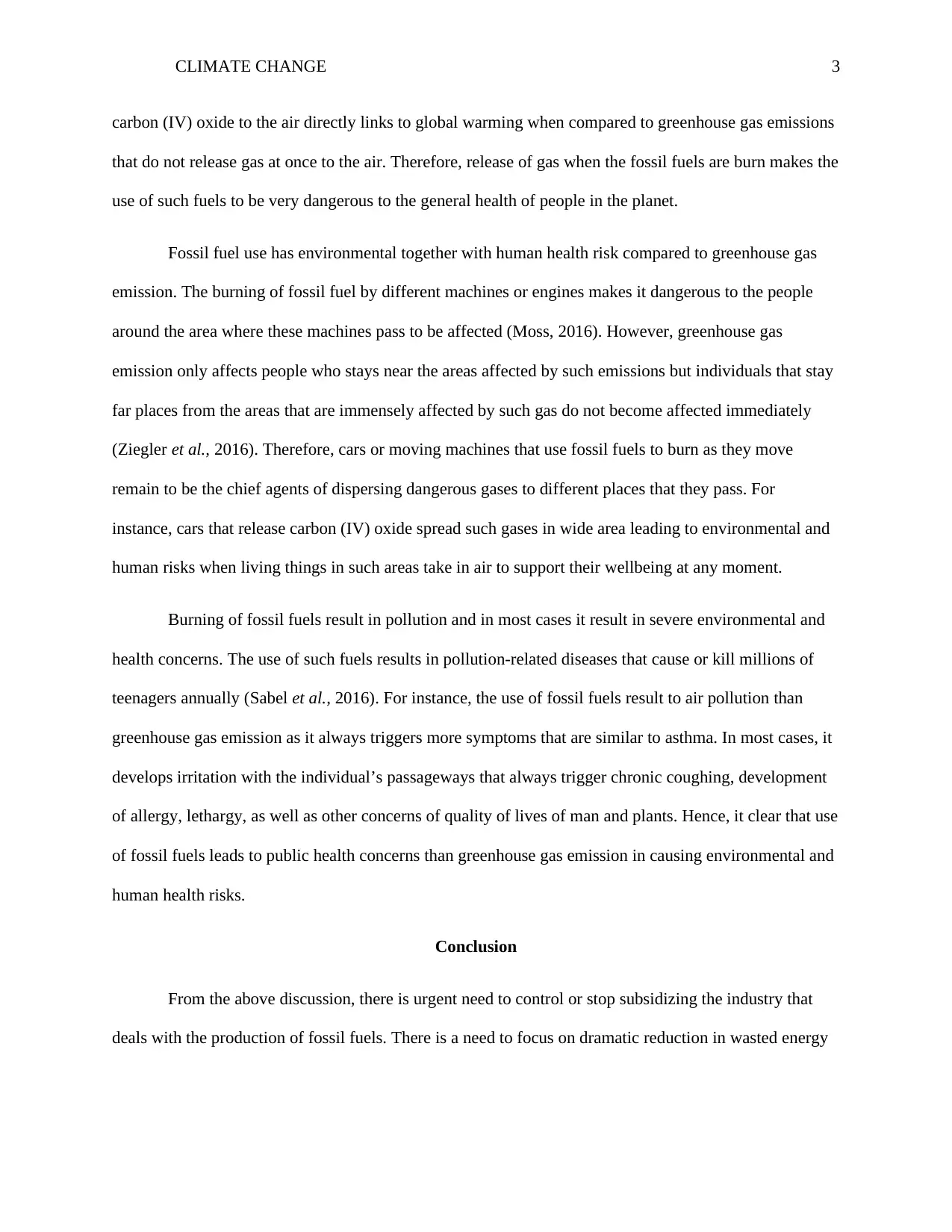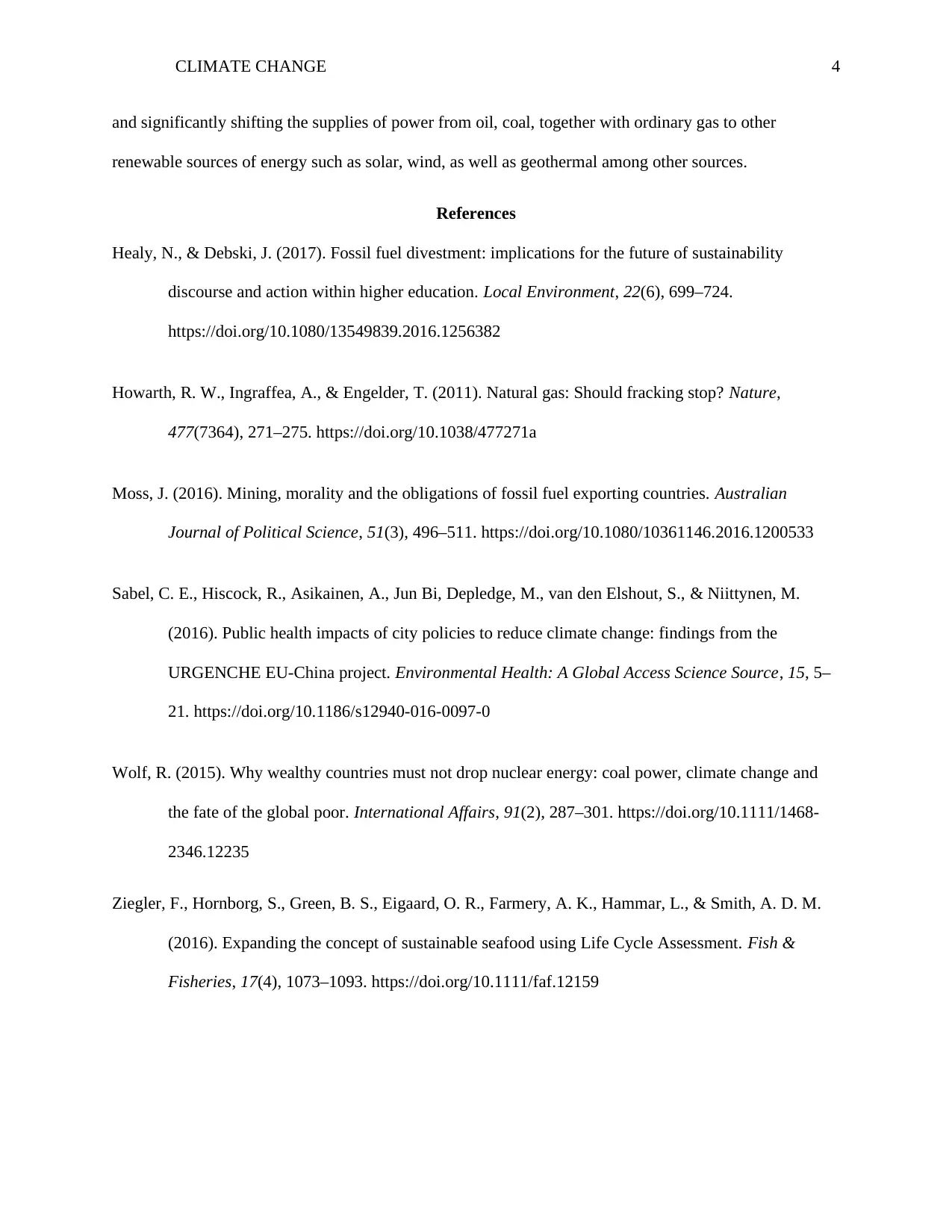Climate Change: Greenhouse Gas Emissions vs. Fossil Fuel Benefits
VerifiedAdded on 2023/05/30
|4
|1173
|470
Essay
AI Summary
This essay examines the debate surrounding fossil fuel use and its impact on climate change, arguing that the environmental and human health risks associated with greenhouse gas emissions outweigh the benefits of fossil fuels. It highlights how the burning of fossil fuels leads to significant pollution, contributing to global warming and various health issues such as asthma and respiratory problems. The essay emphasizes the urgent need to reduce reliance on fossil fuels, advocating for a shift towards renewable energy sources like solar, wind, and geothermal power to mitigate the adverse effects of climate change and protect public health. The paper concludes by calling for an end to subsidies for the fossil fuel industry and a focus on energy conservation and renewable energy development. Desklib offers a platform for students to access similar essays and study resources.

Running Head: CLIMATE CHANGE 1
Climate Change
Name:
Institution Affiliation:
Climate Change
Name:
Institution Affiliation:
Paraphrase This Document
Need a fresh take? Get an instant paraphrase of this document with our AI Paraphraser

CLIMATE CHANGE 2
Introduction
Climate change in global society refers to the shift in the statistical spreading of outlines of
conditions of weather when that variation lasts for an extensive duration. It remains to be the alteration in
average conditions of weather or in difference of the period within circumstance of extended term average
conditions. Besides, change in climate is caused by different factors that range from biotic processes,
plate tectonics, eruption of volcanic, and variation in solar radiation by earth. However, certain activities
of man have been identified to be the primary cause of current change in climatic conditions and this is
often referred to as global warming. According to Healy & Debski (2017), the change has severe effects
on wellbeing of living things such as human and plants. Moreover, human is presently the main cause of
climatic changes on earth and thus the chief drive for future change in climate. Human leads to climatic
forcing that remain to be the imposed change of planetary energy balance that increases accumulation of
carbon (IV) oxide from fossil fuel that remains in the atmosphere for millennia (Moss, 2016). Therefore,
the stand on this paper focuses on the Con of Climate Change that is “The environmental and human
health risks from Climate Change caused by greenhouse gas emissions outweigh the benefits of fossil fuel
use.”
Environmental and human health risks from Climate Change caused by greenhouse gas emissions
outweigh the benefits of fossil fuel use
Fossil fuels uses in modern society are essential in powering everything such as from cars to
lights in homesteads. However, there are presently several debates over the benefits or use of fossil fuels
such as its safety, if it is right to use, and how to cut down its usage in relation to its effect on climate
change in comparison to emissions of greenhouse gas (Howarth, Ingraffea, & Engelder, 2011).
Greenhouse gas emissions outweigh the benefits of fossil fuel use because the use of such fuels has huge
impact that leads to environmental degradation when compared to emission of the gas. According to Wolf
(2015), fossil fuel use causes pollution that result due to direct burning of such fuels that leads to release
of carbon (iv) oxide in large amount into the air when they fossil fuels burn. The release of gases like
Introduction
Climate change in global society refers to the shift in the statistical spreading of outlines of
conditions of weather when that variation lasts for an extensive duration. It remains to be the alteration in
average conditions of weather or in difference of the period within circumstance of extended term average
conditions. Besides, change in climate is caused by different factors that range from biotic processes,
plate tectonics, eruption of volcanic, and variation in solar radiation by earth. However, certain activities
of man have been identified to be the primary cause of current change in climatic conditions and this is
often referred to as global warming. According to Healy & Debski (2017), the change has severe effects
on wellbeing of living things such as human and plants. Moreover, human is presently the main cause of
climatic changes on earth and thus the chief drive for future change in climate. Human leads to climatic
forcing that remain to be the imposed change of planetary energy balance that increases accumulation of
carbon (IV) oxide from fossil fuel that remains in the atmosphere for millennia (Moss, 2016). Therefore,
the stand on this paper focuses on the Con of Climate Change that is “The environmental and human
health risks from Climate Change caused by greenhouse gas emissions outweigh the benefits of fossil fuel
use.”
Environmental and human health risks from Climate Change caused by greenhouse gas emissions
outweigh the benefits of fossil fuel use
Fossil fuels uses in modern society are essential in powering everything such as from cars to
lights in homesteads. However, there are presently several debates over the benefits or use of fossil fuels
such as its safety, if it is right to use, and how to cut down its usage in relation to its effect on climate
change in comparison to emissions of greenhouse gas (Howarth, Ingraffea, & Engelder, 2011).
Greenhouse gas emissions outweigh the benefits of fossil fuel use because the use of such fuels has huge
impact that leads to environmental degradation when compared to emission of the gas. According to Wolf
(2015), fossil fuel use causes pollution that result due to direct burning of such fuels that leads to release
of carbon (iv) oxide in large amount into the air when they fossil fuels burn. The release of gases like

CLIMATE CHANGE 3
carbon (IV) oxide to the air directly links to global warming when compared to greenhouse gas emissions
that do not release gas at once to the air. Therefore, release of gas when the fossil fuels are burn makes the
use of such fuels to be very dangerous to the general health of people in the planet.
Fossil fuel use has environmental together with human health risk compared to greenhouse gas
emission. The burning of fossil fuel by different machines or engines makes it dangerous to the people
around the area where these machines pass to be affected (Moss, 2016). However, greenhouse gas
emission only affects people who stays near the areas affected by such emissions but individuals that stay
far places from the areas that are immensely affected by such gas do not become affected immediately
(Ziegler et al., 2016). Therefore, cars or moving machines that use fossil fuels to burn as they move
remain to be the chief agents of dispersing dangerous gases to different places that they pass. For
instance, cars that release carbon (IV) oxide spread such gases in wide area leading to environmental and
human risks when living things in such areas take in air to support their wellbeing at any moment.
Burning of fossil fuels result in pollution and in most cases it result in severe environmental and
health concerns. The use of such fuels results in pollution-related diseases that cause or kill millions of
teenagers annually (Sabel et al., 2016). For instance, the use of fossil fuels result to air pollution than
greenhouse gas emission as it always triggers more symptoms that are similar to asthma. In most cases, it
develops irritation with the individual’s passageways that always trigger chronic coughing, development
of allergy, lethargy, as well as other concerns of quality of lives of man and plants. Hence, it clear that use
of fossil fuels leads to public health concerns than greenhouse gas emission in causing environmental and
human health risks.
Conclusion
From the above discussion, there is urgent need to control or stop subsidizing the industry that
deals with the production of fossil fuels. There is a need to focus on dramatic reduction in wasted energy
carbon (IV) oxide to the air directly links to global warming when compared to greenhouse gas emissions
that do not release gas at once to the air. Therefore, release of gas when the fossil fuels are burn makes the
use of such fuels to be very dangerous to the general health of people in the planet.
Fossil fuel use has environmental together with human health risk compared to greenhouse gas
emission. The burning of fossil fuel by different machines or engines makes it dangerous to the people
around the area where these machines pass to be affected (Moss, 2016). However, greenhouse gas
emission only affects people who stays near the areas affected by such emissions but individuals that stay
far places from the areas that are immensely affected by such gas do not become affected immediately
(Ziegler et al., 2016). Therefore, cars or moving machines that use fossil fuels to burn as they move
remain to be the chief agents of dispersing dangerous gases to different places that they pass. For
instance, cars that release carbon (IV) oxide spread such gases in wide area leading to environmental and
human risks when living things in such areas take in air to support their wellbeing at any moment.
Burning of fossil fuels result in pollution and in most cases it result in severe environmental and
health concerns. The use of such fuels results in pollution-related diseases that cause or kill millions of
teenagers annually (Sabel et al., 2016). For instance, the use of fossil fuels result to air pollution than
greenhouse gas emission as it always triggers more symptoms that are similar to asthma. In most cases, it
develops irritation with the individual’s passageways that always trigger chronic coughing, development
of allergy, lethargy, as well as other concerns of quality of lives of man and plants. Hence, it clear that use
of fossil fuels leads to public health concerns than greenhouse gas emission in causing environmental and
human health risks.
Conclusion
From the above discussion, there is urgent need to control or stop subsidizing the industry that
deals with the production of fossil fuels. There is a need to focus on dramatic reduction in wasted energy
⊘ This is a preview!⊘
Do you want full access?
Subscribe today to unlock all pages.

Trusted by 1+ million students worldwide

CLIMATE CHANGE 4
and significantly shifting the supplies of power from oil, coal, together with ordinary gas to other
renewable sources of energy such as solar, wind, as well as geothermal among other sources.
References
Healy, N., & Debski, J. (2017). Fossil fuel divestment: implications for the future of sustainability
discourse and action within higher education. Local Environment, 22(6), 699–724.
https://doi.org/10.1080/13549839.2016.1256382
Howarth, R. W., Ingraffea, A., & Engelder, T. (2011). Natural gas: Should fracking stop? Nature,
477(7364), 271–275. https://doi.org/10.1038/477271a
Moss, J. (2016). Mining, morality and the obligations of fossil fuel exporting countries. Australian
Journal of Political Science, 51(3), 496–511. https://doi.org/10.1080/10361146.2016.1200533
Sabel, C. E., Hiscock, R., Asikainen, A., Jun Bi, Depledge, M., van den Elshout, S., & Niittynen, M.
(2016). Public health impacts of city policies to reduce climate change: findings from the
URGENCHE EU-China project. Environmental Health: A Global Access Science Source, 15, 5–
21. https://doi.org/10.1186/s12940-016-0097-0
Wolf, R. (2015). Why wealthy countries must not drop nuclear energy: coal power, climate change and
the fate of the global poor. International Affairs, 91(2), 287–301. https://doi.org/10.1111/1468-
2346.12235
Ziegler, F., Hornborg, S., Green, B. S., Eigaard, O. R., Farmery, A. K., Hammar, L., & Smith, A. D. M.
(2016). Expanding the concept of sustainable seafood using Life Cycle Assessment. Fish &
Fisheries, 17(4), 1073–1093. https://doi.org/10.1111/faf.12159
and significantly shifting the supplies of power from oil, coal, together with ordinary gas to other
renewable sources of energy such as solar, wind, as well as geothermal among other sources.
References
Healy, N., & Debski, J. (2017). Fossil fuel divestment: implications for the future of sustainability
discourse and action within higher education. Local Environment, 22(6), 699–724.
https://doi.org/10.1080/13549839.2016.1256382
Howarth, R. W., Ingraffea, A., & Engelder, T. (2011). Natural gas: Should fracking stop? Nature,
477(7364), 271–275. https://doi.org/10.1038/477271a
Moss, J. (2016). Mining, morality and the obligations of fossil fuel exporting countries. Australian
Journal of Political Science, 51(3), 496–511. https://doi.org/10.1080/10361146.2016.1200533
Sabel, C. E., Hiscock, R., Asikainen, A., Jun Bi, Depledge, M., van den Elshout, S., & Niittynen, M.
(2016). Public health impacts of city policies to reduce climate change: findings from the
URGENCHE EU-China project. Environmental Health: A Global Access Science Source, 15, 5–
21. https://doi.org/10.1186/s12940-016-0097-0
Wolf, R. (2015). Why wealthy countries must not drop nuclear energy: coal power, climate change and
the fate of the global poor. International Affairs, 91(2), 287–301. https://doi.org/10.1111/1468-
2346.12235
Ziegler, F., Hornborg, S., Green, B. S., Eigaard, O. R., Farmery, A. K., Hammar, L., & Smith, A. D. M.
(2016). Expanding the concept of sustainable seafood using Life Cycle Assessment. Fish &
Fisheries, 17(4), 1073–1093. https://doi.org/10.1111/faf.12159
1 out of 4
Related Documents
Your All-in-One AI-Powered Toolkit for Academic Success.
+13062052269
info@desklib.com
Available 24*7 on WhatsApp / Email
![[object Object]](/_next/static/media/star-bottom.7253800d.svg)
Unlock your academic potential
Copyright © 2020–2025 A2Z Services. All Rights Reserved. Developed and managed by ZUCOL.




